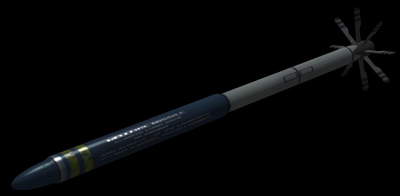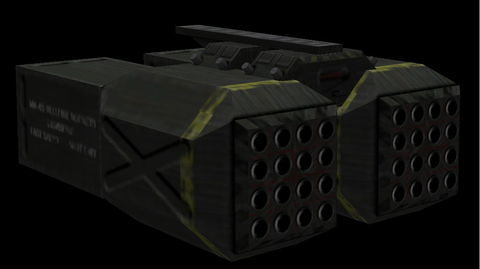Difference between revisions of "Hellfire Missile"
m (*facepalm* Line spacing to accommodate new pictures.) |
(→Veteran Comments) |
||
| Line 27: | Line 27: | ||
| − | Compared to its GTVA counterpart, the Hellfire fires faster, travels faster, has a 34 m range advantage and can be loaded in slightly larger quantities. However, damage per hit is considerably lower, and it does only half of its base damage on shields as compared to the Tempest's 0.6x. In addition, the huge velocity disparity between it and the three main UEF primaries | + | Compared to its GTVA counterpart, the Hellfire fires faster, travels faster, has a 34 m range advantage and can be loaded in slightly larger quantities. However, damage per hit is considerably lower, and it does only half of its base damage on shields as compared to the Tempest's 0.6x. In addition, the huge velocity disparity between it and the three main UEF primaries - the [[Vulcan]], [[Maul]] and [[Rapier]] - means that it is impossible to use the Hellfire in conjunction with them unless you're extremely good at doing so or within very close range of your target. The increased rate of fire also means that Hellfires can be expended quite quickly, not helped by the fact that it travels a lot slower than most common UEF primaries. |
| + | |||
| + | |||
| + | |||
| + | On a missile to missile basis, the Hellfire is actually inferior to the FS1 Fury, having an over 25% shorter range and less subsystem damage. The Hellfire, however, is more likely to hit a target within range given its 80m/s speed advantage and faster reload speed. This missile is what happens when the UEF focuses on making the Fury smaller, not better like the Tempest.}} | ||
[[Category:Blue Planet weapons]] | [[Category:Blue Planet weapons]] | ||
Latest revision as of 04:53, 12 August 2018
| The following information has not been confirmed by Volition and is therefore not canon for the FreeSpace universe. |
|---|
Contents
Description
Blue Planet Tech Room Description

|
|---|
| The SES-O Hellfire Missile |
Standard-issue, wide deployment, high rate-of-fire SES-O dumbfire missile with nuclear-yield explosive charge. Lethal against unshielded targets, but inflicts only reduced damage against shields. The Federation has an ample supply of Hellfires, and thus production of these missiles has been stopped in favor of Paveways and more advanced seeking missiles. First Fleet pilots swear by the Hellfire as a 'third gun', and some space superiority pilots arm their fighters' secondary banks with nothing but Hellfire packs.
Performance
Statistics

|
|---|
| The SES-O Hellfire Missile System (Launcher Rack) |
| Range | 684 m | |
| Reload time | 0.2 s | |
| Velocity | 380 ms-1 | |
| Base Damage | 30 | |
| Armor Damage | 1.0x | 30 |
| Shield Damage | 0.5x | 15 |
| Subsystem Damage | 0.5x | 15 |
| Shockwave Radius | 10 / 20 m | |
| Type: | Dumbfire | |
| View Cone: | N/A | |
| Minimum Lock Time: | N/A | |
| Turn Rate (360 degrees): | N/A | |
Notes
Veteran Comments
Compared to its GTVA counterpart, the Hellfire fires faster, travels faster, has a 34 m range advantage and can be loaded in slightly larger quantities. However, damage per hit is considerably lower, and it does only half of its base damage on shields as compared to the Tempest's 0.6x. In addition, the huge velocity disparity between it and the three main UEF primaries - the Vulcan, Maul and Rapier - means that it is impossible to use the Hellfire in conjunction with them unless you're extremely good at doing so or within very close range of your target. The increased rate of fire also means that Hellfires can be expended quite quickly, not helped by the fact that it travels a lot slower than most common UEF primaries.
